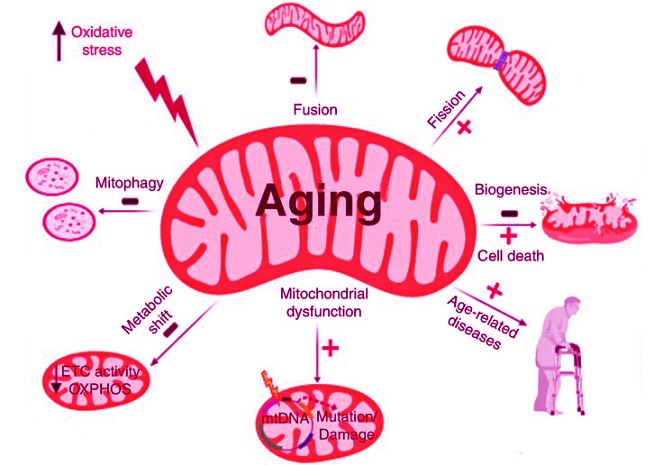Nikhil Prasad Fact checked by:Thailand Medical News Team Nov 26, 2024 1 year, 1 month, 3 hours, 20 minutes ago
Medical News: Recent research sheds light on the intricate relationship between mitochondrial oxidative stress and age-related neurodegenerative diseases like Alzheimer’s and Parkinson’s. A groundbreaking review, involving leading institutions such as the Institut d’Investigacions Biomèdiques de Barcelona (IIBB-CSIC), Universidad de Sevilla, and Universitat de Barcelona in Spain, explores the critical role of mitochondria as both regulators and targets of neuroinflammation.
This
Medical News report delves into the study findings, which underscore how mitochondrial dysfunction exacerbates neuroinflammation, perpetuating a cycle of cellular damage. The research provides a promising avenue for therapeutic interventions targeting these pathways.
 Aging and the Role of Mitochondrial Stress in Neurodegeneration
The Brain’s Immune Landscape: Breaking Old Myths
Aging and the Role of Mitochondrial Stress in Neurodegeneration
The Brain’s Immune Landscape: Breaking Old Myths
Once thought to be immune-privileged, the brain is now known to harbor a complex neuroimmune network. The innate immune cells, including microglia and CNS-associated macrophages, work alongside adaptive immune players like lymphocytes to maintain brain health. However, aging disrupts this balance, leading to increased infiltration of peripheral immune cells. This contributes to chronic neuroinflammation - a hallmark of neurodegenerative diseases.
The review highlights how specific brain-resident immune cells shift towards a proinflammatory state, fueled by mitochondrial oxidative stress. Mitochondria, central to cellular energy production, also generate reactive oxygen species (ROS) that can activate inflammatory pathways.
Mitochondria: The Double-Edged Sword
Mitochondria play a pivotal role in sustaining cellular function. However, their dysfunction transforms them into sources of damage-associated molecular patterns (DAMPs), amplifying immune responses. ROS, byproducts of mitochondrial respiration, activate redox-sensitive transcription factors such as NF-κB and AP-1, promoting inflammation. Additionally, oxidized mitochondrial DNA (mtDNA) released into the cytosol triggers inflammasome assembly, intensifying the immune response.
The researchers detail how disrupted mitophagy - mitochondria's quality control mechanism - leads to the accumulation of damaged mitochondria. This sets off a cascade involving inflammasomes, which are protein complexes that drive the release of inflammatory cytokines and pyroptosis, a form of cell death.
Neurodegeneration Under the Microscope
The study extensively reviews two major neurodegenerative diseases - Alzheimer’s and Parkinson’s - linking mitochondrial oxidative stress to their progression.
-Alzheimer’s Disease (AD): Amyloid-beta plaques and tau tangles are exacerbated by mitochondrial dysfunction. The review highlights how dysfunctional mitochondria activate the NLRP3 inflammasome, creating a feedback loop of inflammation and neurodegeneration.<
br />
-Parkinson’s Disease (PD): Misfolded alpha-synuclein aggregates trigger similar mitochondrial responses. Inhibiting these pathways in animal models showed reduced neuronal loss and improved motor function.
Notably, markers of inflammasome activation have been detected in the cerebrospinal fluid of patients, suggesting their potential as diagnostic tools.
Therapeutic Horizons: Targeting the Mitochondrial Pathway
The findings open doors to innovative therapeutic strategies:
-Inflammasome Inhibitors: Blocking NLRP3 has shown promise in reducing inflammation and protein aggregates in preclinical models.
-Antioxidants: Enhancing mitochondrial antioxidant capacity could mitigate oxidative stress and subsequent inflammation.
-Nanomedicine: Targeted delivery of antioxidants using nanoparticles presents a futuristic approach to treating neurodegeneration.
The researchers also emphasize the need to balance therapeutic interventions to avoid compromising the immune system.
Conclusions: Bridging Science and Therapy
This comprehensive review underscores the central role of mitochondrial oxidative stress in driving neuroinflammation and neurodegeneration. By targeting these pathways, there is potential to halt or even reverse the progression of debilitating conditions like Alzheimer’s and Parkinson’s.
Future research must focus on translating these findings into clinical solutions, ensuring therapies are effective, safe, and targeted. Addressing challenges like drug delivery and immune modulation will be crucial for success.
The study findings were published in the peer-reviewed journal: Antioxidants.
https://www.mdpi.com/2076-3921/13/12/1440
For the latest on Neurodegeneration, keep logging on to Thailand
Medical News.
Read Also:
https://www.thailandmedical.news/news/sars-cov-2-proteins-linked-to-brain-inflammation-and-neurodegeneration
https://www.thailandmedical.news/news/breaking-news-study-reveals-potential-new-form-of-brain-neurodegeneration-linked-to-covid-19
